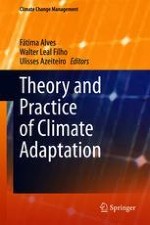2018 | OriginalPaper | Chapter
Embedding Adaptation into Development Planning and Decision Making Process at the Municipal Levels in Mozambique
Authors : Luís Artur, Casimiro António, Olanda Bata, Felisberto Afonso, Gilberto Muai
Published in: Theory and Practice of Climate Adaptation
Publisher: Springer International Publishing
Activate our intelligent search to find suitable subject content or patents.
Select sections of text to find matching patents with Artificial Intelligence. powered by
Select sections of text to find additional relevant content using AI-assisted search. powered by
